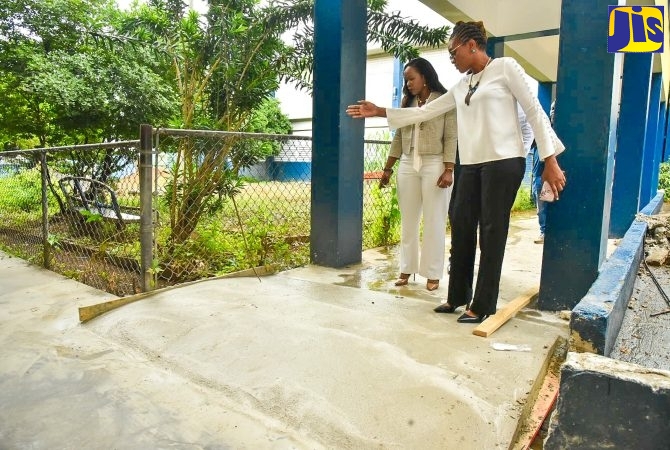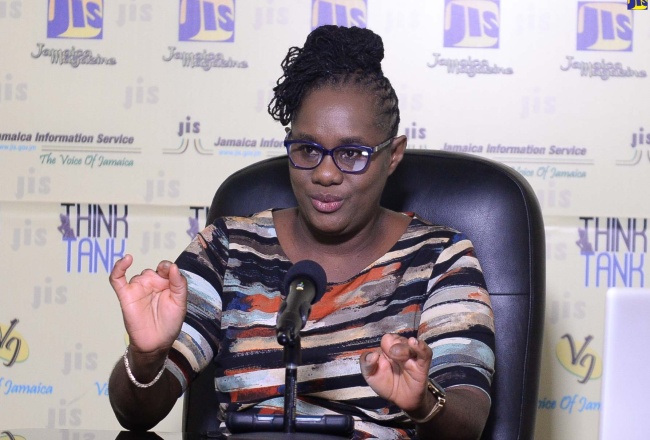More Persons, Entities Seeking to Comply with Disabilities Act
By: , August 11, 2023The Full Story
More individuals and entities are seeking information and advice on how best they can treat with persons with disabilities since the Disabilities Act came into effect over a year ago.
Executive Director of the Jamaica Council for Persons with Disabilities (JCPD), Dr. Christine Hendricks, tells JIS News that persons have been reaching out to the organisation and requesting sensitisation sessions.
“Persons, business places, various institutions… they have been asking more questions in terms of what do I need to do, how can I garner training for my staff on how to interact with persons with disabilities. So, the sensitisation requests have been greater,” she notes.
“Usually, we invite ourselves in, but more and more businesses and organisations are inviting us in for presentations and sensitisation, wanting partnerships just to help them to build out better… infrastructure or their customer service delivery to persons with disabilities,” she adds.
The Disabilities Act, which was passed in 2014, makes provisions to safeguard and enhance the welfare of persons with disabilities across Jamaica.
It came into effect on February 14, 2022, following the approval of the Disabilities Regulations in 2021.
Dr. Hendricks notes that the Council has been taking steps to ensure that persons are adhering to the Act and has adopted an accessibility checklist, which has been approved by the Bureau of Standards Jamaica (BSJ).
It is based on the Americans with Disabilities Act Accessibility Guidelines and Chapter 11 (Accessibility) of the Kentucky Building Code 1997.
This checklist is designed to identify architectural and communication barriers encountered by persons with disabilities in private and public facilities.
“So, we have that available to help entities to tick off and check off their own organisation in terms of infrastructure access. It is a checklist that asks some questions and provides some information on measurements, on how to make the information that you have on your signage, in your buildings, more accessible to persons with low vision or visual impairments,” Dr. Hendricks tells JIS News.
The accessibility checklist also includes guidelines for making web content more available to people with disabilities, and how persons who are deaf, can access information.
“So, this checklist provides a wide range of information to help companies, entities, organisations to just ensure that their space is more accessible to persons with disabilities and to the society in general,” Dr. Hendricks says, noting that universal access also benefits other vulnerable groups such as children and the elderly.
Dr. Hendricks says the Ministry of Education and Youth, in accordance with the Disabilities Act, has the responsibility to ensure that all educational facilities that fall under their purview are accessible to persons with disabilities.
As such, all infrastructure development projects for schools will comply with the legislation, with provisions for access to classrooms, bathrooms, and floors.

Work is under way to install chair lifts at several schools that have multiple floors, including Sydney Pagon Academy in St. Elizabeth and at Mount St. Joseph’s High in Manchester.
Works to enable disability access are also being carried out at Holmwood Technical High in Manchester and Bridgeport High in St. Catherine.
Construction is set to begin in short order at Exchange All-Age in St. Ann, while approvals are pending from the municipal authority for Cedric Titus High and Albert Town High in Trelawny.
In addition, access ramps are being built at the Merl Grove High School in St. Andrew at a cost of $2 million.
Dr. Hendricks says that society must begin to restructure its mind around “what all access” entails, which, she notes, is more than the provision of ramps and rails.
She says that while there are infrastructure impediments, there are attitudinal and other barriers that limit access for persons with disabilities.
Citing barriers in communication, she says there are not many persons who are able to speak sign language to the deaf community or hire the service of interpreters to facilitate their business processes.
“So, while the infrastructure is critical… we want to also focus on communicating with our deaf persons, whether through sign language or closed caption. How many national media services have closed caption on the newscast that most if not everyone listens to or watch? That is something that is very simple, very easy to fix, but it remains a barrier,” Dr. Hendricks laments.
“Every morning, as you listen to the television, they place the time on the screen. For [example] they will say the time…. is and you hear silence. That is very easy to fix; it is not anything structural. All they need to do is say the time, because people who are blind or visually impaired will not see the numbers on the screen,” she points out.
The JCPD Executive Director notes that while the Disabilities Act has been in effect for over a year, “it will take some time for everything to line up, and hence the Council exists to ensure that we fall in line as a society and we don’t leave anyone behind, and that includes persons with disabilities”.
She notes that the legislation provides two years for the country to get its infrastructure in place or at least have a plan that will see a progressive realisation of people with disabilities being able to participate in all areas of life.
Those who do not comply with the Act may have to face a Cabinet-appointed Tribunal, which has been set up to hear breaches.
“Once a complaint has been made formally to the Council (JCPD)… the investigation takes place. If the matter cannot be resolved, it can then be taken to mediation. If that does not resolve it and the parties agree that it cannot be resolved, then it goes to the Tribunal,” Dr. Hendricks explains.
She says that the Tribunal is preparing to hear matters.
“The Council has received quite a bit of complaints. We have been working through a number of them; some have been resolved, some remain unresolved and those unresolved will be taken by the Tribunal,” she tells JIS News.
Some of the complaints include treatment of students at educational institutions, access to the national airports, and employment matters.
“So, we have greater advocacy with persons indicating where and how it is that people are not adhering. So, you will hear the voices get louder, which is good because it means that there is an area that needs to be addressed,” Dr. Hendricks says.
The Disabilities Act is in keeping with the United Nations Convention on the Rights of Persons with Disabilities (UNCRPD).
Jamaica has signed on to the Convention along with 60 other countries.
For further information persons may visit the JCPD website at https://jcpd.gov.jm/.




